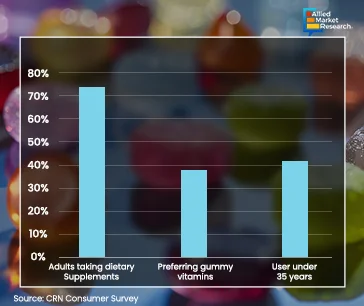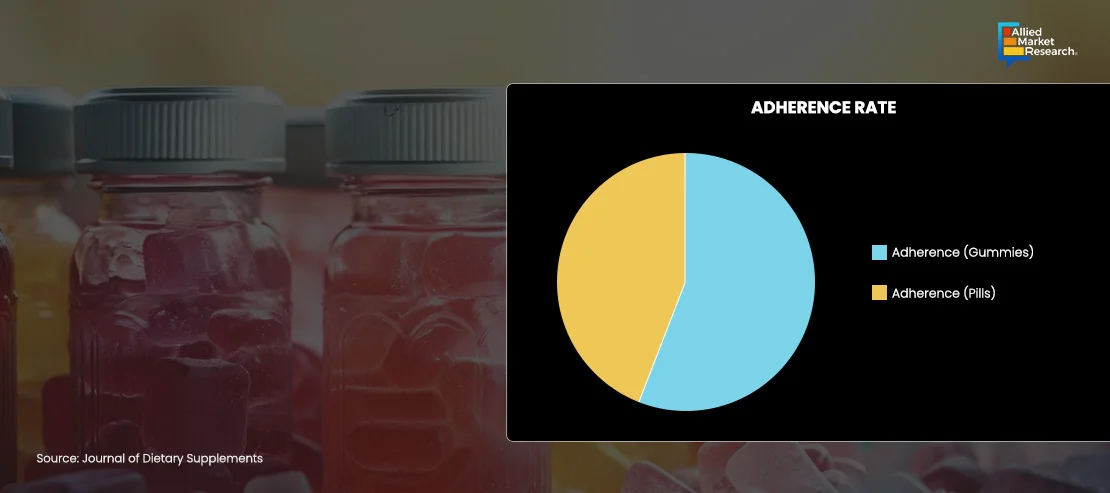Table Of Contents

Roshan Deshmukh

Koyel Ghosh
Gummy Vitamins: Health Meets Happiness

Gummy vitamins cater to various needs and preferences that traditional pill-based supplements often fail to meet. Many people, especially children and the elderly, find swallowing pills difficult. And this is where gummy vitamins come into the play by offering a chewable and more accessible alternative. Their appealing flavors and fun shapes make them significantly more enjoyable to consume than traditional vitamins, which typically have unpleasant tastes or aftertastes. This palatability enhances compliance with daily supplement regimens, ensuring individuals are more likely to take their vitamins consistently. For consumers suffering from medical conditions like dysphagia (difficulty swallowing), gummy vitamins provide a practical solution. Additionally, these vitamins can be formulated to include a wide range of essential nutrients, addressing specific dietary deficiencies or health needs in a single, enjoyable product. Overall, gummy vitamins provide a convenient, pleasant, and effective way to support daily nutritional intake, particularly benefiting those who struggle with traditional supplement forms.
Moreover, gummies, designed to mimic candy, offer a candy-like taste that makes them easy to consume and appealing to both children and adults. Research indicates a high demand for multivitamin gummies, particularly those that are plant-based and organic. The rising popularity of gummies as dietary supplements among millennials in the United States, particularly for inflammation, is driven by several factors. Gummies provide a convenient and enjoyable way to take supplements, catering to millennials' busy and on-the-go lifestyles. Additionally, the increasing health consciousness among this demographic significantly contributes to their preference for gummy supplements. Research indicates that 43% of Millennials prioritize using vitamins, minerals, and dietary supplements (VMS) to support their mental well-being.
According to studies by the National Center for Biotechnology Information (NCBI), adherence to vitamin D supplementation among pregnant and lactating women using tablets varied between 69% and 75%. Pregnancy often brings nausea and vomiting, making it difficult for some women to swallow large pills. In contrast, gummy vitamins, being chewable and easier to ingest, accommodate altered taste preferences and heightened sensitivity to smells and flavors during pregnancy. This encourages consistent use. Additionally, gummy vitamins are gentler on the stomach, which is beneficial for women experiencing increased gastrointestinal sensitivity. Their appealing taste and enjoyable form can lead to better adherence to a prenatal vitamin regimen, ensuring pregnant women receive essential nutrients like folic acid, iron, calcium, and DHA. Overall, gummy vitamins offer a more comfortable, enjoyable, and practical solution for pregnant women, helping them maintain their nutritional intake more consistently than traditional tablets.

Types of Gummy Vitamins: Diversifying Wellness with Taste and Convenience
Prenatal Gummy Vitamins cater specifically to pregnant women and those trying to conceive, offering essential nutrients such as folic acid, DHA, iron, and calcium crucial for fetal development and maternal health. These vitamins are designed to be gentle on the stomach, addressing common issues like morning sickness and nausea. Moreover, children’s Gummy Vitamins are formulated to support children’s growth and immune function with vitamins A, C, D, E, B-complex, and essential minerals like calcium and iron. Their appealing shapes and flavors encourage regular intake, ensuring comprehensive nutritional support for growing bodies.
Adult Multivitamin Gummies provide a balanced blend of vitamins and minerals essential for adults' overall health, including immune support, sustained energy levels, and bone strength. Vegan Gummy Vitamins, on the other hand, provide a convenient and enjoyable alternative to traditional pills, making daily supplementation easier and more pleasant. Specifically designed for vegans and vegetarians, these gummies are free from animal products and often use pectin instead of gelatin. They supply essential nutrients such as vitamin B12, vitamin D, and omega-3s, which are commonly deficient in plant-based diets, effectively addressing dietary needs while respecting dietary restrictions.
Consumer Preference for Gummy Vitamins
According to the Council for Responsible Nutrition's 2021 Consumer Survey on Dietary Supplements, 73% of U.S. adults take dietary supplements, with 39% preferring gummy vitamins. Notably, gummy vitamins are particularly popular among younger consumers, with 42% of users being under the age of 35. This data highlights the significant penetration of gummy vitamins in the dietary supplement market, especially among younger demographics.
Health and Nutrient Data: The Popularity of Gummy Vitamins
According to data published in the Journal of Dietary Supplements, gummy vitamins typically contain an average of 2-3 grams of sugar per serving. This palatable form of supplementation has led to higher adherence rates among consumers, with 85% of users consistently taking their gummy vitamins as directed, compared to a 68% adherence rate for those using conventional pills. This increased adherence highlights the effectiveness of gummy vitamins in helping individuals maintain their nutritional supplement routines.


Olly – A Case Study in Market Leadership and Innovation in the U.S. Gummy Vitamins Market
Olly, a leading brand in the U.S. gummy vitamins market, has established itself through product innovation and strategic partnerships with major retailers like Target, Walmart, and Amazon. Founded in 2014 by Eric Ryan, Olly offers a diverse range of products targeting various health concerns such as immunity, sleep, stress, beauty, and general wellness. By 2021, Olly had captured approximately 11% of the U.S. gummy vitamins market, equating to around USD 295 million in a USD 2.68 billion industry.
According to a Council for Responsible Nutrition (CRN) survey, Olly's focus on taste and convenience particularly appeals to younger consumers, with 42% of users under 35 years old. A study by the Journal of Dietary Supplements further revealed that 70% of Olly users prefer gummy vitamins over traditional pills due to their pleasant taste and ease of consumption.
Despite challenges such as the sugar content in gummy vitamins, Olly has introduced sugar-free options and adheres to Good Manufacturing Practices (GMPs) to ensure product quality. The company is also addressing environmental concerns by exploring sustainable packaging solutions. Olly's consumer-centric approach, innovative products, and commitment to ethical practices have solidified its leadership in the competitive nutraceutical market.

Risk of overdosing
Gummy vitamin supplements have surged in popularity, with sales projected to double to $14 billion by 2027. However, experts caution that the candy-like taste and texture of melatonin supplements raise the risk of overdose, particularly in children, as calls to Poison Control for melatonin overdoses have surged by 530% over the past decade. The formulation of vitamins into gummies results in quicker nutrient degradation due to exposure to heat, light, and moisture compared to pills. Additionally, testing has revealed that gummy vitamins frequently contain significantly different amounts of ingredients than what is stated on their labels. While some sweetness makes supplements appealing, gummies mimic candy too closely at the expense of safety and reliability.
A recent analysis of melatonin and CBD gummies has also yielded similar results. Some gummy vitamins have been found to contain only about 34% of the nutrients stated on their labels. Unlike pharmaceuticals, which are tightly regulated by the FDA, dietary supplements are subject to more lenient controls, allowing for significant variability in their contents. In 2020, the FDA approved its first Investigational New Drug Application for a gummy medication, but to date, no such product has been released to the market.
"If you have something that you need a specific amount of every time you take it, gummies are not the way to go," says Pieter Cohen, a doctor at Cambridge Health Alliance, in Somerville, Massachusetts, and the lead author of the melatonin-CBD research. Medical professionals generally agree that taking excessive amounts of supplements is usually less hazardous than overdosing on prescription medications. However, consuming large quantities of supplements can still lead to toxicity. Dr. Cooperman specifically advises against purchasing gummies, suggesting that they may pose additional risks.
End Note
Gummy vitamins are a popular and effective alternative to traditional supplements, especially for those who have difficulty swallowing pills, such as children, the elderly, and pregnant women. Their appealing flavors and chewable form improve adherence and make it easier to maintain consistent nutrient intake. Available in various formulations for general health, immunity, and beauty, gummy vitamins are convenient but should be consumed in moderation due to added sugars and the risk of overconsumption. They are definitely a user-friendly option for supporting health and well-being.
AMR's in-depth insights can guide vendors in effectively implementing best practices for gummy vitamins. By analyzing market trends and consumer preferences, AMR helps businesses refine quality control, enhance label transparency, and design targeted educational campaigns. AMR’s data also supports strategic partnerships with healthcare professionals and optimizes marketing strategies to highlight unique selling points. Utilizing the insights ensures that businesses maximize their engagement in the competitive gummy vitamin market. For more updates on gummy vitamins and how they can impact your profit line, contact our experts today!

